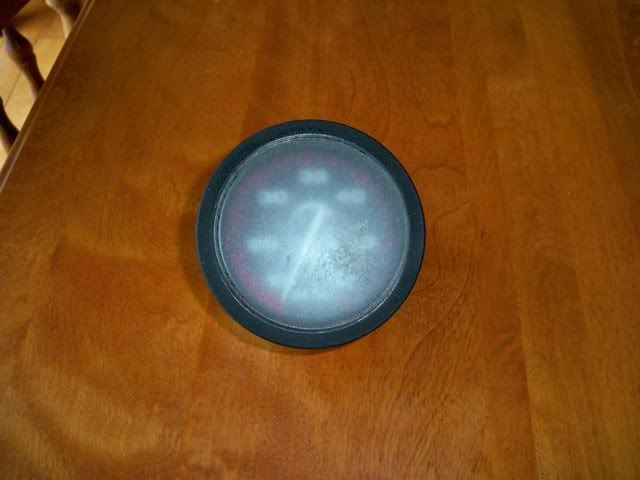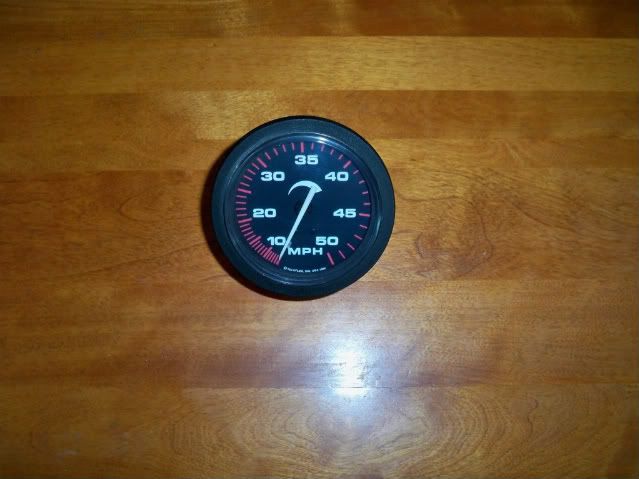You are using an out of date browser. It may not display this or other websites correctly.
You should upgrade or use an alternative browser.
You should upgrade or use an alternative browser.
How to remove scratches from plastic?
- Thread starter Soeren_DK
- Start date
Help Support GroupDIY Audio Forum:
This site may earn a commission from merchant affiliate
links, including eBay, Amazon, and others.
sahib
Well-known member
Obviously remove the clear facia.
The whole process depends on how deep the scratches are but as this is a VU meter start with 1200 grit wet and dry sand paper. If the scratches are very deep then you can start with thicker paper such as 800-1000 grit and then move onto 1200.
Dip the sand paper into water and first gently sand only the scratched area, using a circular motion. Do not sand dry. Always wet the paper.
Once the scratch is minimised reasonably then sand down the entire surface. The whole thing will end up as opaque.
Take a bit of flat/thick cardboard in about A4 size, such as the ones that are generally at the back of note pads. You know what I mean. Kind of grey colour. Basicaly what we are looking for is a paper material. If you have a sheet of balsa wood that is used in making model aeroplane it will do too.
Now, you can use many types of polishing compunds here but the one that you use to polish the paintwork of your car will do the job. You can also look for Jeweller's Rouge.
Pour some polishing compound onto the cardboard and rub the clear facia again in circular motion. Every so often wipe off the compound and check how the surface is coming up. You'll get to a stage that the polishing compound will penetrate into the cardboard or the balso wood and the surface of it will be like ice.
When the facia turns nice and clear, do not apply anymore polishing compount. Instead rub it dry onto the now "icy" surface of the paper for a while to finish it off.
Experiment with other bits of plastic before doing the VU.
Do not use polishing mop mounted onto drill. You'll burn the whole plastic. That is not for this sort of material.
The whole process depends on how deep the scratches are but as this is a VU meter start with 1200 grit wet and dry sand paper. If the scratches are very deep then you can start with thicker paper such as 800-1000 grit and then move onto 1200.
Dip the sand paper into water and first gently sand only the scratched area, using a circular motion. Do not sand dry. Always wet the paper.
Once the scratch is minimised reasonably then sand down the entire surface. The whole thing will end up as opaque.
Take a bit of flat/thick cardboard in about A4 size, such as the ones that are generally at the back of note pads. You know what I mean. Kind of grey colour. Basicaly what we are looking for is a paper material. If you have a sheet of balsa wood that is used in making model aeroplane it will do too.
Now, you can use many types of polishing compunds here but the one that you use to polish the paintwork of your car will do the job. You can also look for Jeweller's Rouge.
Pour some polishing compound onto the cardboard and rub the clear facia again in circular motion. Every so often wipe off the compound and check how the surface is coming up. You'll get to a stage that the polishing compound will penetrate into the cardboard or the balso wood and the surface of it will be like ice.
When the facia turns nice and clear, do not apply anymore polishing compount. Instead rub it dry onto the now "icy" surface of the paper for a while to finish it off.
Experiment with other bits of plastic before doing the VU.
Do not use polishing mop mounted onto drill. You'll burn the whole plastic. That is not for this sort of material.
Or if you have friends who are into car painting, just ask them.
The danger in polishing plastic, you can melt it if you apply too much speed/pressure.
But the same applies to car paint, so they have these large polishing pads that go slow.
I had a record player lid that was looking ugly and used, I gave it to my friend, and he brought it back looking shiny and brand new...
;D
The danger in polishing plastic, you can melt it if you apply too much speed/pressure.
But the same applies to car paint, so they have these large polishing pads that go slow.
I had a record player lid that was looking ugly and used, I gave it to my friend, and he brought it back looking shiny and brand new...
;D
Ptownkid
Well-known member
I had to restore some boat gauges this summer, and all i used was a 3M headlight restoration kit...


Worked exceptionally well! This took less than 10 minutes and there is not a single scratch left.
I did this with a cordless drill held between my knees and light pressure with constant movement. Water is your friend!


Worked exceptionally well! This took less than 10 minutes and there is not a single scratch left.
I did this with a cordless drill held between my knees and light pressure with constant movement. Water is your friend!
There are some 'directions for use' to download on the 3M website
http://solutions.3m.com/wps/portal/3M/en_US/3MAutomotive/Aftermarket/Products/Featured_Products/Headlight/
The process is basically the same than Sahib posted; wet sanding, then polishing... They start with 800 grade (500 for deeper scratches), then 1000, then 3000! And then finish with the polish compound.
Axel
http://solutions.3m.com/wps/portal/3M/en_US/3MAutomotive/Aftermarket/Products/Featured_Products/Headlight/
The process is basically the same than Sahib posted; wet sanding, then polishing... They start with 800 grade (500 for deeper scratches), then 1000, then 3000! And then finish with the polish compound.
Axel
I tried today the experiments.
First with 800-1000-1200 wet sand paper and then with a Sonox product from my car shelf - http://www.sonax.com/Car-Care/Products/Exterior-Paintwork-and-Chrome/Wax-Sealing/%28tab%29/1/%28so%29/1/%28node%29/12779/201200-SONAX-Xtreme-Brillant-Wax-1-NanoPro.
I tried and tried but every time I ended up with small scratches on the cover. Not very large one but if you have an idea that the surface will be totally clean this is not.
So I thought maybe I should try some other Polisher. Then I bought a product in a local shop - http://www.biltema.se/ProductImages/36/large/36-626_l.jpg but it didn't do the job either.
Is there a different between Polish and Wax? And should I try with 3000 wet sand paper?
Cheers
Søren
First with 800-1000-1200 wet sand paper and then with a Sonox product from my car shelf - http://www.sonax.com/Car-Care/Products/Exterior-Paintwork-and-Chrome/Wax-Sealing/%28tab%29/1/%28so%29/1/%28node%29/12779/201200-SONAX-Xtreme-Brillant-Wax-1-NanoPro.
I tried and tried but every time I ended up with small scratches on the cover. Not very large one but if you have an idea that the surface will be totally clean this is not.
So I thought maybe I should try some other Polisher. Then I bought a product in a local shop - http://www.biltema.se/ProductImages/36/large/36-626_l.jpg but it didn't do the job either.
Is there a different between Polish and Wax? And should I try with 3000 wet sand paper?
Cheers
Søren
sahib
Well-known member
When you say small scratches do you mean that some of the old ones still remain, or you end up creating more scratches?
Simply explaining you have to sand down the whole surface to the same level as the scratch to get rid of it completely. If the scratch is very deep this becomes exteremely difficult to get rid of, in some cases impossible. Even if the scratch is polished, the fact that it is deeper then the rest it will show up. Otherwise I do not see how it would not polish completely. However, one thing that you should take into account that acrylic based material will sand down and polish well but pvc and polycarbonade will not. Therefore they are generally flame polished.
There is a difference between polish and wax in the sense that the viscosity and the grityness will vary. The whole point of sanding down is to bring the surface as smooth as possible before polishing it. In fact the wax or polish is also abrasive like a sand paper except that it does it at a much finer level. But if the scratches are deeper than all will happen is that you'll polish the scratch clear but it will still stay there.
You can certainly move up to 3000 grit sand paper before you apply the polish and that Sonox stuff also looks fine to me. I actually polish using what here is called TCut which is a lot more abrasive.
When you are polishing you can also do it in a linear motion rather than circular if you are still getting scratches.
Simply explaining you have to sand down the whole surface to the same level as the scratch to get rid of it completely. If the scratch is very deep this becomes exteremely difficult to get rid of, in some cases impossible. Even if the scratch is polished, the fact that it is deeper then the rest it will show up. Otherwise I do not see how it would not polish completely. However, one thing that you should take into account that acrylic based material will sand down and polish well but pvc and polycarbonade will not. Therefore they are generally flame polished.
There is a difference between polish and wax in the sense that the viscosity and the grityness will vary. The whole point of sanding down is to bring the surface as smooth as possible before polishing it. In fact the wax or polish is also abrasive like a sand paper except that it does it at a much finer level. But if the scratches are deeper than all will happen is that you'll polish the scratch clear but it will still stay there.
You can certainly move up to 3000 grit sand paper before you apply the polish and that Sonox stuff also looks fine to me. I actually polish using what here is called TCut which is a lot more abrasive.
When you are polishing you can also do it in a linear motion rather than circular if you are still getting scratches.
sahib said:When you say small scratches do you mean that some of the old ones still remain, or you end up creating more scratches?
It looks like I'm making small new ons.
I took my bike and drove out to the local carpainting shop. The gave me some 2000 wet sand paper and some polishing called "Advanced Liquid Compound G3"...
After doing the same, 800-1000-1200 and the 2000 wet sand paper and polishing with the Liquid from the paintshop it now looks like a million. Woooooow. I had never thought these meters would look like new again. The where really scratched.
Thanks for the help Sahib....
I will post some pictures before and after the polishing process.
Cheers
Søren
sahib
Well-known member
Great stuff. Weldone.
kazper
Well-known member
This is good stuff here... I have some old VU meters that I would love to look like new.
Now.... just need something to practice on...
Now.... just need something to practice on...
strangeandbouncy
Well-known member
Hi,
I have an LA4 that was covered in foam during a fire. It attacked to vu meter, leaving it unreadable. I used T-Cut, and it came out a treat!
Kindest ergards,,
ANdyP
I have an LA4 that was covered in foam during a fire. It attacked to vu meter, leaving it unreadable. I used T-Cut, and it came out a treat!
Kindest ergards,,
ANdyP
Similar threads
- Replies
- 10
- Views
- 357
- Replies
- 3
- Views
- 469
- Replies
- 22
- Views
- 1K


